August, 18 2010, 03:56pm EDT
Tell NBC: Sunday Morning Needs a Real War Debate
Meet the Press features a parade of Afghanistan hawks
NEW YORK
The war in Afghanistan has re-emerged as a major news story, thanks to the controversies surrounding the removal of Gen. Stanley McChrystal and the WikiLeaks release of classified documents. But on NBC's Meet the Press, the opportunity to engage in a robust debate about the war has taken a back seat to promoting the views of the military and supporters of Obama's Afghanistan policies.
The most recent example came on August 15, when Meet the Press devoted the entire episode to a profile of Gen. David Petraeus. Host David Gregory's opening indicated it wasn't going to be a feet-to-the-fire interview: "At 57, General David Petraeus is easily America's most famous warrior. On this morning we find him in the middle of physical training as this fiercely competitive four-star general works over soldiers half his age with the same intensity as he works the war plan."
Gregory questioned Petraeus about the timeline for withdrawal of U.S. troops as if it were an irritant: "How stifling is the concept of this deadline and this Washington debate to what you're trying to do here?" At the close of the broadcast, Gregory echoed that sentiment and worried about the public's lack of support:
"General Petraeus is a military leader with great commitment and great intellectual rigor, but you have to wonder whether he has enough time politically to achieve what he thinks is possible here.... The question now for the American public is whether it has the stomach and the will to do what it takes to succeed here, and whether it has the stomach for what could happen here if the U.S. and its allies fail." The hour with Petraeus was in keeping with recent patterns on the show. Right after the WikiLeaks disclosure, the show's August 1 broadcast led with Gregory announcing, "The leaking of secret Afghanistan war documents has enraged U.S. military officials who warn of serious consequences for the leaker and the man behind the Web site WikiLeaks." The featured one-on-one interview was with Adm. Mike Mullen, chairman of the Joint Chiefs of Staff. There were no guests on hand to comment from an antiwar perspective.
On July 11, the program featured a one-on-one interview with White House press secretary Robert Gibbs that touched briefly on the war. The show's panel discussion featured MSNBC host Rachel Maddow, who offered a somewhat mild critique of the war, mostly stressing that a withdrawal timeline improves the performance of the Afghan government. Her co-panelists were conservative pundit David Brooks and Ed Gillespie of the Republican State Leadership Committee, both of whom support the war effort to varying degrees (Brooks called himself a "strong supporter," while Gillespie opposes any talk of a withdrawal timeline).
On June 27, Meet the Press devoted significant time to Afghanistan, thanks to the McChrystal controversy. The one-on-one interview was with Republican Sen. John McCain, a die-hard supporter of the war who opposes a withdrawal timetable.
The panel discussion that followed was notable in that it featured a rarity: a bona fide anti-war voice in Rep. Barbara Lee (D-Calif.). But Lee was surrounded by pro-war guests: writer Sebastian Junger, retired U.S. Army captain Wes Moore, retired general Barry McCaffrey and Tom Ricks of the Center for a New American Security. Any talk of leaving Afghanistan was outnumbered by the pro-war majority. Junger stated that if U.S troops leave, the Taliban are "going to be right back in Afghanistan." Ricks added, "I think if you want an endless war, Congresswoman, leave Afghanistan right now, and you'll find us having to go after Al-Qaeda again and again there for decades." At one point Junger even objected to Lee's terminology, arguing that "the word occupation really is not accurate."
So in weeks when public support for the war has continued to drop (CNN's most recent poll shows 62 percent oppose the war--8/6-10/10), why has NBC been so intent on promoting the war? It is hard to overlook the fact that NBC's parent company General Electric is heavily involved in weapons-related contracts with the U.S. military, and has also benefited from reconstruction contracts in Iraq and Afghanistan (Center for Public Integrity, 10/31/03).
On one recent show (7/11/10), Gregory mused that "finding the ideological fault lines here are difficult between left and right, frankly." But the host of Meet the Press can't "find" a debate only because he refuses to have one on his show.
Click here to sign FAIR's petition today!
FAIR, the national media watch group, has been offering well-documented criticism of media bias and censorship since 1986. We work to invigorate the First Amendment by advocating for greater diversity in the press and by scrutinizing media practices that marginalize public interest, minority and dissenting viewpoints.
LATEST NEWS
Israel Becomes First Nation to Recognize Somaliland—But Still Rejects Palestine
One foreign policy analyst said that Israel views Somaliland as a "strategic location as a launch pad for strikes on Yemen and potentially a place to forcibly 'relocate' Palestinians to."
Dec 26, 2025
Israel became the first nation to recognize Somaliland as a sovereign state on Friday, a move that was met with criticism from international observers who questioned its continued unwillingness to recognize a Palestinian state.
Somaliland, a breakaway region in the north of Somalia that is home to more than 6 million people, declared independence in 1991, but until now, no United Nations member states have recognized its claim.
Israeli Prime Minister Benjamin Netanyahu described his government's recognition of the territory as being “in the spirit of the Abraham Accords,” a deal brokered by US President Donald Trump for Israel to normalize relations with some of its Arab neighbors, which has itself been accused of disregarding the issue of Palestinian sovereignty.
Speaking over a video call with Abdirahman Mohamed Abdullahi, the president of Somaliland, Netanyahu said he was signing "Israel's official recognition of Somaliland and its right of self-determination," calling the friendship between the two nations "seminal and historic."
In a statement, Abdullahi said Israel's recognition "represents a milestone in Somaliland's long-standing pursuit of international legitimacy, reaffirming its historical, legal, and moral entitlement to statehood."
However, a report from the Guardian suggested that Israel's recognition of Somaliland has less to do with the self-determination of its people than with Israel's military interests. It cited a November report from a prominent Israeli think tank, which argued that Somaliland could be used as a base of military operations against Yemen's Houthis.
Somaliland, located in the horn of Africa just south of the Arabian Peninsula, already hosts an air base that the United Arab Emirates has used to conduct operations against the Yemeni militant group, which—until a "ceasefire" agreement was reached in October—launched regular attacks on Israel and its vessels in the Red Sea in what it said was an effort to pressure it to stop its genocidal military campaign in Gaza.
Egypt and Turkey condemned Israel's agreement with Somaliland, saying, "This initiative by Israel, which aligns with its expansionist policy and its efforts to do everything to prevent the recognition of a Palestinian state, constitutes overt interference in Somalia’s domestic affairs.”
Foreign ministers for the two nations joined those of Somalia and neighboring Djibouti on a call following the development, where they called for the continued unity of Somalia as an institution and condemned Israel's efforts "to displace the Palestinian people from their land."
Adil Haque, a professor at Rutgers Law School, pointed out on social media that, in August, Netanyahu met with Somaliland's leadership "offering recognition in exchange for helping Israel to illegally deport Palestinians from Gaza."
Somaliland was one of many nations reportedly approached by Israel to warehouse Palestinians exiled from the strip permanently—others included Indonesia, Uganda, South Sudan, and Libya.
Following reports at the time that Somalia was also in consideration, its president, Hassan Sheikh Mohamud, responded that "the idea of removing Palestine from their own land and putting them into another, other people’s land—I don’t see that that’s a solution at all."
A senior Israeli official who spoke on condition of anonymity with Israel's Channel 12 reportedly agreed that Netanyahu's recognition of Somaliland undermines his repeated assertions that there will never be a Palestinian state. As the Times of Israel summarized: "The official... points out that while Israel is the first country to grant recognition to Somaliland, the rest of the world considers the breakaway region an integral part of Somalia."
Tariq Kenney-Shawa, a fellow at the Palestinian Policy Network and a producer at AJ+, said: "To state the obvious, Israel wouldn’t recognize anyone unless there was something in it for them. Israel doesn’t give a shit about Somaliland apart from its strategic location as a launch pad for strikes on Yemen and potentially a place to forcibly 'relocate' Palestinians to."
Keep ReadingShow Less
'Horrible Racist' Stephen Miller Slammed for Using Classic TV Christmas Special to Bash Immigrants
"Dean Martin and Frank Sinatra would hate Stephen Miller and his politics," said one critic in response to Miller.
Dec 26, 2025
Top Trump White House aide Stephen Miller on Friday elicited disgust after he said that a beloved Christmas television special reminded him of his own personal animus toward immigrants.
Miller, often seen as the architect of President Donald Trump's mass deportation policy, revealed in a post on X that he and his children had just watched "Christmas with The Martins and The Sinatras," a one-off 1967 TV holiday special that featured singers Dean Martin and Frank Sinatra.
Miller then quickly pivoted from that to once again bash immigrants who come to the US.
"Imagine watching that," Miller wrote, "and thinking America needed infinity migrants from the third world."
As Rolling Stone politics reporter Nikki McCann Ramírez pointed out in response, both Martin and Sinatra both had parents who were first-generation Italian immigrants.
"Dean Martin was born Dino Paul Crocetti and gave himself a stage name because of braindead xenophobes like Stephen," McCann Ramírez observed. "Sinatra was also a child of Italian immigrants. Imagine watching them and thinking immigrants didn’t build the culture you fetishize today."
A similar point was made by civil rights attorney Sherrilyn Ifill in a post on Bluesky.
"Imagine watching Sinatra, son of Dolly and Antonini born in Genoa and Sicily, respectively," she wrote, "and Martin, son of Gaetano and Angela, born in Montesilvano, Italy and Ohio respectively... and crusading against the value of children of immigrants to the US."
Journalist and author Jeff Yang added some historical context to Miller's remarks by noting that Italian immigrants in the early and middle decades of the 20th century faced many of the same stereotypes that Miller and his political allies ascribe to immigrants from Latin America.
"A reminder," Yang wrote, while also posting old cartoons that featured racist depictions of Italians, "that Dean Martin and Frank Sinatra’s parents emigrated here during a period when Italians were considered to be a genetically inferior and criminal-minded underclass that Stephen Miller’s racist predecessors said should be excluded from America."
Yang added that Frank Sinatra's mother "ran an underground free abortion clinic, chained herself to a fence to fight for women’s suffrage, and was an extremely influential organizer for the Democratic Party."
Princeton University historian Kevin Kruse promoted Yang's thread that demonstrated Miller's apparent ignorance of Dean and Sinatra's family histories, and said it showed the Trump adviser is "a horrible racist in the sense that he is actually not that good at being racist."
Tim Wise, a senior fellow at the African American Policy Forum, managed to find an upside to Miller's holiday-themed anti-immigrant rant.
"The one silver lining in all this sickness is that one day your children will despise you as much as most of America already does," he commented.
Film producer Franklin Leonard was even more succinct in his response to Miller.
"Dean Martin and Frank Sinatra would hate Stephen Miller and his politics," he wrote.
Keep ReadingShow Less
Trump's 'Bomb Magnet' Fleet Could 'Never Sail' and Waste Billions of Dollars: Experts
"A future administration will cancel the program before the first ship hits the water," said one critic.
Dec 26, 2025
President Donald Trump on Monday announced that the US Navy is building a new class of warship that will be named after him—but naval warfare experts are warning the project looks like a wasteful boondoggle.
Mark Cancian, a senior adviser at the Center for Strategic and International Studies, wrote an analysis of the Trump-branded ships the day after their announcement in which he bluntly predicted that they "will never sail."
Among other things, Cancian argued that the ship being commissioned by the president "will take years to design, cost $9 billion each to build, and contravene the Navy’s new concept of operations, which envisions distributed firepower."
As if that weren't enough, Cancian projected that "a future administration will cancel the program before the first ship hits the water."
Dan Grazier, a senior fellow and program director at the Stimson Center, also predicted doom for Trump's prized ships, which he said would be too overloaded with the latest cutting-edge technology to be effective at naval combat.
"Every gadget you add to one of these systems is one more thing that can break," Grazier wrote in an analysis published by the Quincy Institute for Responsible Statecraft. "When designers lack discipline, as they obviously did while sketching out this latest future boondoggle, a simple mathematical truth asserts itself."
In fact, Grazier felt so confident in his gloomy prognostication for Trump's warships that he told readers they could "take it to the bank."
"The Navy will spend tens of billions of dollars over the course of the next decade on the Trump-class program," he wrote. "At best, the Navy will receive three troublesome ships that will cost more than $10 billion each before then entire scheme is abandoned."
William Hartung, a senior research fellow at the Quincy Institute for Responsible Statecraft, flagged a particularly troubling detail of Trump's warship plan in a lengthy analysis published by Forbes on Thursday.
"The most troubling aspect of the proposed Trump-class ships is that they are supposed to carry sea-launched nuclear armed cruise missiles," Hartung explained. "The last thing the US military needs is yet another way to deliver nuclear weapons. And because nuclear-armed cruise missiles are difficult to tell from cruise missiles armed with nonnuclear bombs, there is a danger that and adversary could mistake an attack with a nonnuclear armed missile with a nuclear attack, with devastating consequences."
Hartung also pointed out that the ships, which are projected to cost billions each, are not the only pricey weapons system that Trump is planning to build, as earlier this year he vowed to build a "Golden Dome" missile defense system that is projected to cost anywhere from $292 billion and $3.6 trillion.
"It’s time for Congress to do its oversight job and slow down these 'golden' programs until the administration can make a plausible case that they can be both affordable and effective," Hartung concluded. "The odds are against them."
Bernard Loo, senior fellow at Singapore’s S. Rajaratnam School of International Studies, said in an interview with CNBC that Trump's proposed ships appear to be "a prestige project more than anything else."
Loo argued that the proposed ships' massive size, with each projected to displace more than 35,000 tons while measuring more than 840 feet, would make each vessel a "bomb magnet" for adversaries.
"The size and the prestige value of it all make it an even more tempting target," Loo added.
Keep ReadingShow Less
Most Popular


